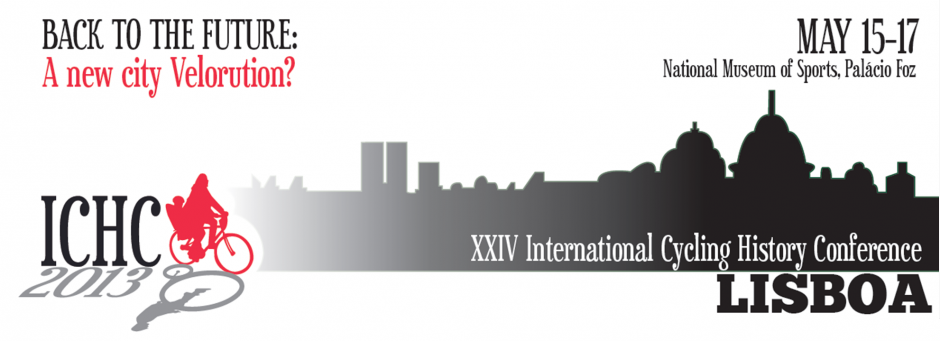Back to the future: a new city Velorution?

Back to the future: a new city Velorution? is the theme for the ICHC Lisbon 2013.
In the press of the late nineteenth century the bicycle is associated with progress, a term that emphasizes the belief in the ability of men to make their own history based on technological achievements and material prosperity. The very modern movement propelled by bicycles was seen as progress and considered at the time as a Velorution.
From technology and industry, through sports and leisure, to museums, all contribute to make memories of the past a heritage identity of contemporary societies. However little or much, specific or diverse, this heritage identity easily fulfils an apologetic function: to keep the nostalgic remembrance of times past to legitimize the liberal order of mobility in the modern world. What other paths of memory, albeit more discreet but decidedly more critical, can convey the experience of emancipation, of utopia, of the Velorution? Cycling history emerges from this complex web of personal memories, collective memory, knowledge inherited from institutional constraints, and political questions anchored in the present. It is this tale that the conference aims to explore once more.
In the past two years, one of the peculiarities associated with the cities that have organized an ICHC is the availability of heritage material, sometimes arranged as a temporary exhibition or even in a museum. These exhibits shows us a past that, like a kaleidoscope, holds a multiplicity of meanings and settings about the bike and/or about cycling. In Portugal there is not a Museum of the Bicycle, while the Museum of Cycling offers a fixed exhibit with a strict chronological approach to the construction of heroism in the context of road cycling competition. How can the differences in election and/or preservation investment of such a heritage identity be interpreted for each place? How then to weave the stories of the bike into the collective memory? How to characterize the politics of memory linked to the bike and cycling?
The last century witnessed great social changes that originated particulary from the reduction of working hours and prolongation of life expectancy, a world in which part of the kilometres travelled are increasingly used to participate in leisure-related activities. All this mobility can be understood as a way of inhabiting the planet as we know it, as well as an awareness of its smallness, i.e., the enclosure of the world. How then to understand over time the continuities and fractures of the meaning of the bike within the various forms of mobility: spatial, emotional, professional, linked to stages of life, playful roles, consumer activities? What values organize, numb and/or stimulate its meaning?
Philosophically the project of modernity is based on a kinetic utopia that is questioned nowadays, under the light of the environmental problems that affect public health, and jeopardize the integrity of life on the planet. Progress as a concept behind this project is now also under suspicion. In the context of a so-called “risk society”, is there a reconfiguration of the meaning of cycling? Given the increase of urban bikers, particularly in large cities (for example London, Paris and New York), is there a new Velorution taking place?


















